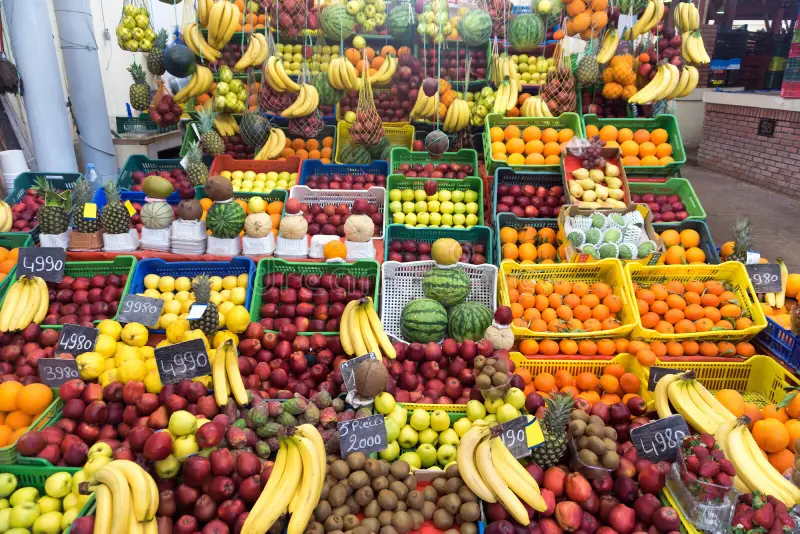
Tunisia’s fruits and vegetables follow the rhythm of the seasons:
Spring brings tender green peas, fava beans, and artichokes, often found in stews like marqa or gently sautéed with olive oil and garlic.
Summer is a colorful festival of tomatoes, zucchinis, eggplants, bell peppers, and cucumbers, the building blocks of iconic dishes like slata mechouia and couscous with vegetables.
Autumn offers an abundance of pomegranates, grapes, figs, and sweet potatoes, reflecting the richness of the harvest.
Winter introduces hearty cabbages, carrots, turnips, cauliflowers, and citrus fruits like oranges and lemons—all staples of comforting cold-season dishes.
Tunisia’s fruits are not just delicious—they are part of its identity. Dates, especially the famed Deglet Nour from the south, are considered "the fruit of light." They’re enjoyed fresh or dried, in pastries like makroud, or even stuffed with almonds.
Citrus groves dot the Cap Bon region, where oranges, lemons, and mandarins thrive. In spring, orange blossom water perfumes sweets and drinks.
Figs, especially in late summer, are a national favorite, as are prickly pears (karmous el hindi), sold by street vendors on hot days, peeled and served chilled.
In Tunisia, vegetables are never a side dish—they are central to the cuisine. Souks overflow with seasonal produce. Markets like the ones in Sfax, Nabeul, or Tunis’s Bab El Fellah are sensory experiences: vibrant colors, loud bargaining, and earthy scents.
Popular uses include:
Chakchouka: A spicy vegetable medley with eggs.
Couscous bil khodhra: Couscous with vegetables like carrots, zucchini, and chickpeas.
Mloukhia: A dark, rich stew made from finely ground jute leaves—unique to the region.
In recent years, Tunisia has seen a rise in organic farming and farmer’s cooperatives, especially in regions like Zaghouan and Kef. Many small producers focus on heirloom varieties and seasonal, pesticide-free crops, creating a growing movement toward healthier, sustainable eating.
Beyond their nutritional value, many fruits and vegetables carry symbolic meaning:
Olives (and olive oil) are sacred, representing peace, health, and heritage.
Pomegranates symbolize abundance and fertility.
Watermelons, sliced and served in family gatherings, mark the joy of summer.
If you visit Tunisia, don't just explore the museums—visit the local markets, taste fresh tomatoes still warm from the sun, sip a juice made from grenadine or figue de barbarie, or join a village harvest.
Tunisia’s fruits and vegetables are not only ingredients—they are the soul of the land, rooted in centuries of tradition and grown with care under its generous sun.